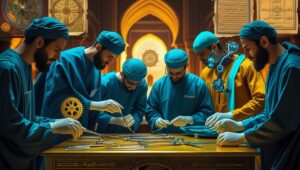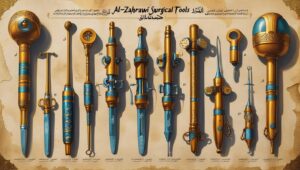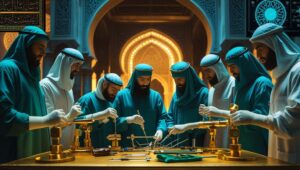Ancient Hackers: Islamic Medicine Inventions & Surgical Robots You Never Knew Existed
Did you know that medieval Islamic doctors were the original tech wizards behind some of the most extraordinary medical inventions in history?
During the Islamic Golden Age, visionaries like Al-Zahrawi, Ibn Sina, and Al-Razi transformed the world of medicine with radical ideas and innovative tools.
These pioneers made lasting breakthroughs—from
sophisticated surgical instruments
to techniques that still shape modern healthcare.
﴾ وَمَنْ أَحْيَاهَا فَكَأَنَّمَا أَحْيَا النَّاسَ جَمِيعًا ﴿
“And whoever saves one life, it is as if he had saved all of mankind.”
— [Qur’an 5:32]
The Islamic Golden Age:
Birthplace of Medical Innovation
Welcome to the era known for pioneering Islamic medical history—the Islamic Golden Age (8th–14th centuries). This was a period of unrivaled scientific advancement that changed the trajectory of medicine forever.
- Systematic Hospitals:
Bimaristans—some of the world’s first organized hospitals—offered free treatment to all, professional staff, medical libraries, and departments for every specialty. - Early Pharmacies:
The first pharmacies (“saydalas”) introduced strict quality controls and prescription-based medicine. - Scientific Medical Methodology:
Physicians emphasized clinical observation, documentation, and experimentation—foundations of modern scientific practice.
Centers of Knowledge: Standout institutions like Baghdad’s House of Wisdom, Cairo’s Al-Azhar, and Cordoba’s libraries fueled breakthroughs that shaped the world’s Islamic medical history.
Groundbreaking
Islamic Medicine Inventions
Dive into the legacy of Islamic medicine inventions—marvels that shaped medical history and transformed scientific practice forever.
Anesthesia
Ibn Sina described sedative-soporific sponges soaked in herbs like opium and mandrake—an early form of anesthesia for surgical procedures.
Antiseptics
Al-Razi championed alcohol-based cleaning agents to sterilize wounds and tools—a revolutionary advance to prevent infection.
Surgical Tools
Al-Zahrawi invented over 200 surgical instruments, including scalpels, forceps, and wound hooks, many still inspiring today’s surgery kits.
Pharmacies (Apothecaries)
The rise of “saydalas”—regulated pharmacies—brought science-backed medicines and set the foundation for the pharmacy profession, led by medieval Islamic doctors.
Clinical Trials
Al-Razi was among the first to run controlled experiments to test new medicines, pioneering the concept of evidence-based treatment.

Al-Zahrawi surgical tools:
Surgical robots of their time
Al-Zahrawi (Albucasis) is celebrated as the “father of surgery” for his groundbreaking achievements in the Islamic Golden Age. His inventive genius forever changed the course of surgical science.
Born in 936 AD in Al-Andalus, Al-Zahrawi authored the medical encyclopedia “Al-Tasrif”, revealing over 200 innovative surgical instruments and techniques. His meticulous documentation and design inspired generations.
Innovative Al-Zahrawi surgical tools include:
- Forceps
— Delicate instruments for tissue manipulation; their sophisticated design echoed early “robotic” precision. - Scalpels
— Finely honed blades for surgical incisions, famous for their sharpness and ergonomic build. - Cauterization Tools
— Ingenious devices to stop bleeding and ward off infection; advanced for their era.
Al-Zahrawi surgical tools were so complex and precise, they’re often compared to the “surgical robots” of their era—empowering surgeons with unprecedented capabilities centuries ahead of their time.
Through the vivid illustrations and instructions in Al-Tasrif, Al-Zahrawi trained future generations of doctors, his knowledge spreading from the Islamic world to Western medicine and shaping surgical practice for centuries.
 Diagram of iconic Al-Zahrawi surgical tools from Al-Tasrif.
Diagram of iconic Al-Zahrawi surgical tools from Al-Tasrif.
“And when I am ill, it is He (Allah) who cures me.”
— [Qur’an 26:80]
Unveiling the Geniuses:
Medieval Islamic Doctors Who Changed Medical History
Meet the medieval Islamic doctors whose brilliance defined Islamic medical history and revolutionized health forever.
Ibn Sina (Avicenna)
The Prince of Physicians
- Authored “The Canon of Medicine”
—a standard text in Europe for 500+ years, blending Greek, Persian, and Islamic medical knowledge. - Advanced early diagnosis, quarantine, and herbal remedies.
Al-Razi (Rhazes)
The Chemist-Physician
- Founded and managed innovative hospitals in Baghdad and Rayy.
- First to distinguish measles from smallpox.
- Promoted early vaccine concepts using scientific method.
Ibn al-Nafis
Discoverer of Pulmonary Circulation
- Overturned centuries of Galenic theory by accurately describing
pulmonary blood flow—how blood moves from the heart to the lungs and back. - Wrote extensively on medicine, anatomy, and philosophy.
- Al-Zahrawi—developed crucial surgical techniques and taught through illustrated manuals.
- Al-Tabari—compiled encyclopedias of medicines and therapies.
- Al-Majusi—produced pioneering studies in obstetrics and physiology.
“And say: My Lord, increase me in knowledge.”
— [Qur’an 20:114]
How Islamic Medicine Inventions
Shaped Modern Healthcare
The brilliance of Islamic medicine inventions lives on in every hospital, operating room, and pharmacy today. Their legacy bridges ancient wisdom with modern medical breakthroughs.
Influence on Renaissance Medicine
Discoveries from the Islamic Golden Age were translated into Latin and studied across Europe, igniting the medical Renaissance. Manuals by Al-Zahrawi and Ibn Sina became textbooks for centuries.
Birth of Modern Hospitals
Pioneering systematic hospitals (Bimaristans) inspired the organization of today’s clinics, integrating wards, pharmacies, and ethical standards that define global healthcare.
From Surgical Tools to Robotic Surgery
Al-Zahrawi’s instruments—from forceps to scalpels—set the blueprint for modern surgical kits. His focus on innovation and precision echoes now in robotic-assisted surgeries and biomedical engineering.
Pharmaceutical Science & Clinical Trials
Early pharmacies (“saydalas”) and evidence-based testing pioneered by Islamic doctors underpin today’s pharmaceutical advances and clinical best practices.
“Allah has not sent down a disease except that He has also sent down its cure.”
— [Hadith, Sahih Al-Bukhari 5678]
Conclusion & Call-to-Action
The legacy of Islamic medical history still inspires doctors, scientists, and innovators globally. These timeless discoveries—from pioneering surgical inventions to holistic medical philosophy—prove that knowledge, compassion, and curiosity know no bounds.
- What was your favorite Islamic medicine invention?
- Do you know of an unsung medical innovator who deserves more recognition?
- Drop your reflections in the comments or post on social media with #IslamicMedicalHistory!
Stay inspired—keep discovering the incredible stories, wisdom, and advances of our shared medical past.
Subscribe for more amazing historical spotlights or explore our library of medical history articles!
“So blessed be Allah, the Best of creators.”
— [Qur’an 23:14]
🔥 Wild Islamic Medicine FAQ 🔥
- Soporific Sponges – Herbal anesthesia ahead of its time!
- Alcohol Antiseptics – Clean surgery before germ theory!
- 200+ Custom Surgical Tools (some worked like “surgical robots”!)
- Clinical Trials – Evidence-based medicine, medieval edition.
- The World’s First Pharmacies – Real pharmacies, run by medieval Islamic doctors.
📚 References & Recommended Reading
- Salim Al-Hassani, “1001 Inventions: The Enduring Legacy of Muslim Civilization.” Comprehensive exploration of Islamic Golden Age science, featuring profiles of legendary doctors and inventors, including Al-Zahrawi and Ibn Sina.
- Peter E. Pormann & Emilie Savage-Smith, “Medieval Islamic Medicine.” Academic overview of medical innovation, hospitals, and clinical practices in the medieval Islamic world.
- The World History Encyclopedia: “Islamic Medicine”
worldhistory.org/Islamic_Medicine/ - The British Library: “Al-Zahrawi and his Legacy”
bl.uk/people/al-zahrawi - Toby Huff, “The Rise of Early Modern Science: Islam, China, and the West.”
- Sami Hamarneh, “Developments in Clinical and Experimental Medicine in Islam and Western Europe.”
- National Institutes of Health: “Al-Zahrawi (Albucasis) — Pioneer of Modern Surgery.”
ncbi.nlm.nih.gov/pmc/articles/PMC6074161/ - BBC: “Islamic Scholars Who Shaped Modern Medicine.”
bbc.co.uk/islamic-medicine - Muslim Heritage: “Al-Razi, the Clinical Physician.”
muslimheritage.com/article/al-razi-clinical-physician - National Library of Medicine: “A Glimpse into the Medical World of Medieval Islam.”
nlm.nih.gov/exhibition/islamic_medical

